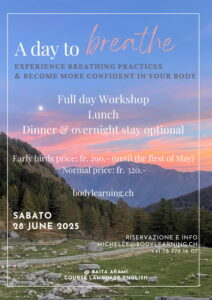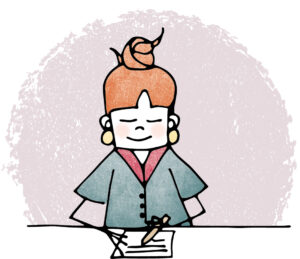 How can we access the deep inner knowing that already lives within us?
How can we access the deep inner knowing that already lives within us?
In my experience, the first step is calming — or perhaps more accurately, quieting — the mind and its constant stream of thoughts, plans, opinions, and judgments. This doesn’t mean shutting the mind off, especially because shutting it off is so difficult, but rather shifting our attention toward the signals and sensations of the body. [Read more]
Reconnecting
 Reconnecting with the body, which is ultimately my aim in working with clients, allows to tap into a great deal of information that we find locked away within ourselves. My way to do so is to engage the whole body in breathing, movement and bodyattention.
Reconnecting with the body, which is ultimately my aim in working with clients, allows to tap into a great deal of information that we find locked away within ourselves. My way to do so is to engage the whole body in breathing, movement and bodyattention.
We can also broaden the experience by including the connection with Nature.
This is what will happen on the 28 of June during the next Day to Breathe: by practicing in a more natural environment, we will open up other levels of perception. [Read more]
Perceiving Ourselves
 For several months now, I’ve been working with groups on the theme of anxiety management and how to prevent and stop panic attacks.
For several months now, I’ve been working with groups on the theme of anxiety management and how to prevent and stop panic attacks.
Not only the work with participants offered me – once again – moments of great satisfaction, but it has also taught me a lot about the strategies we develop to avoid… feeling ourselves.
This is nothing new, but it’s always touching to observe how what we feel in our bodies can be perceived as something too invasive, too uncomfortable and dangerous to be contained within us.
When this happens, we feel overwhelmed by negative sensations that we don’t want to feel, and also we don’t recognise easily.
As a result, in order to protect ourselves from this potential experience we tense up, reduce our breathing and sometimes restrict ourselves in rigid and limited postures. [Read more]
Being Alive, Feeling Alive
 Are you breathing ? And how do you feel your body right now?
Are you breathing ? And how do you feel your body right now?
These are two questions my clients have to hear from me. Very often 🙂
Usually, the first one gets a most popular answer : ‘of course I am breathing, otherwise I would be death’. I am always happy to hear this: it signals the basic level of awareness that my work needs. Breathing is fundamental for survival.
The second question, on the other hands, provokes several types of answer with one main content : ‘what do you mean “how do I feel my body”. It is normal, I don’t feel anything.’
When we are not in touch with the sensations from the body, it means that we are in survival mode.
Because to be alive, you have to feel …. alive 😉
Actually, when we have the impression of not feeling, it indicates a lack of practice of self-perception, and this happens when we are not very used to perceiving ourselves from the inside.
Our perception is formed through the information gathered by our receptors. For example, many of them are located on our skin and help us adapt and react to the environment: they perceive changes in temperature, pain, pressure, touch.
Others allow us to assess our inner state: temperature, tension, digestion process, tiredness, stress level, energy level, concentration level and so on. This inner perception helps us to answer the question ‘how do I feel?’ and to check whether we are feeling good or not.
But like any human capacity, the less you exercise it, the less available it becomes.
It becomes underdeveloped. This happens with our muscles, our intelligence or our sensitivity. If we do not use them, they atrophy.
A poor perception of the internal state can lead to many types of problems: muscle tension causing pain, digestion problems, rigid postures. Disconnection from emotions, emotional detachment leading to agitation and anxiety. Mild depression and demotivation. Too high a level of stress causes hormonal imbalances – such as insulin resistance – cardiovascular problems, burn out… We may find ourselves disconnected from healthy and enjoyable people and activities.
Because we are bombarded by too many inputs, sometimes much of our attention, if not all of it, is absorbed by what is happening outside. And we end up dealing with our inner state by ignoring it. We end up in surviving mode by automatically avoiding that which requires us to pay attention to something else.
Let’s take an amusing example: if you have to avoid becoming the dinner of a long-toothed tiger, you cannot deal with the neglecting experiences you suffered from your parents. Immediate survival comes first. The emotional need comes later.
You can replace the tiger with any kind of fear or insecurity.
Or, if you have to protect yourself and your beloved ones by moving camp or engaging in a long and crucial hunting session, you can ignore the feeling of hunger or exhaustion. Immediate survival first. Secondary physical needs later.
You can replace the camp move or hunting session with the pressure of taking the ‘right’ decision.
To get out of survival mode, you must ask yourself:
Am I breathing? Can I breathe consciously, deeply, long and slowly?
This will calm the stress reaction.
How do I feel my body? Notice your posture, the contact of your skin with fabrics and materials, the movement of your breath, your emotional and mental state.
This will bring attention back into you, so that you can focus on your state.
Survival is important, but being alive is even more so. And being alive requires feeling alive.
As always, I will be very happy to support you in feeling alive.
Time spent with friends
 For this first article of the year, I would like to focus on the topic concerning friendship and start by asking you these two questions:
For this first article of the year, I would like to focus on the topic concerning friendship and start by asking you these two questions:
- How much time do you dedicate to your friends ? By ‘friends’ I mean all the people you love, appreciate and enjoy to spend time with.
- And are you satisfied with the time spend together?
The Devil you Know
 I am often asked to explain what I do in my praxis, what the benefits are for my clients or for what types of conditions my method is intended for. As my work alleviates many kind of problems and can help in many different situations in life, I always find it a little difficult to summarise what I do. Especially when “it should” be a short, simple and clear answer.
I am often asked to explain what I do in my praxis, what the benefits are for my clients or for what types of conditions my method is intended for. As my work alleviates many kind of problems and can help in many different situations in life, I always find it a little difficult to summarise what I do. Especially when “it should” be a short, simple and clear answer.
But working with emotions, body’s sensations and life situations is often far from being short, simple and clear 🙂
The ‘easier’ answer would be “in my work I teach my clients to perceive more their bodies, to better understand their automatic patterns in order to stop them” and my work “alleviates stress symptoms and physical and emotional pains”.
A bit too impersonal, don’t you think?
[Read more]